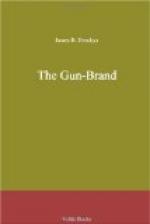The position of the quarter-breed’s fort admitted only one plan of attack—to rush the barricade that stretched across the neck of the little peninsula. MacNair longed for action. He chafed with impatience to strike the blow that would crush forever the power of Lapierre, yet he found himself wholly at the mercy of Lapierre. For somewhere behind that barrier of logs was the woman he loved. He shuddered at the thought. He knew Lapierre. Knew that the man’s white blood and his education, instead of civilizing, had served to heighten and to refine the barbaric cruelty and savagery of his heart. He knew that Lapierre would stop at nothing to gain an end. His heart chilled at the possibilities. He dreaded to act—yet he knew that he must act.
He dismissed the idea of a siege. A quick, fierce assault—an attack that should have no lull, nor armistice until his Indians had scaled the stockade, was preferable to the heart-breaking delay of a siege. MacNair decided to launch his attack with so fierce an onslaught that Lapierre would have no time to think of the girl. But if worse came to worst, and he did think of her, what he would do he would be forced to do quickly.
Grimly, MacNair led his warriors to the attack, and as the lean-faced horde moved silently through the timbered aisles of the swamp, the sound of scattering shots was borne to their ears as the scouts exchanged bullets with Lapierre’s sentries.
A cleared space, thirty yards in width, separated the forest from the barricade, and with this clearing in sight, in the shelter of the snow-laden spruces, MacNair called a halt, and in a brief address gave his Indians their final instructions. In their own tongue he addressed them, falling naturally into the oratorical swing of the council fire.
“The time has come, my people, as I have told you it must sometime come, for the final reckoning with Lapierre. Not because the man has sought my life, am I fighting him. I would not call upon you to risk your lives to protect mine; not to avenge the burning of my storehouse, nor yet, because he dug my gold. I am fighting him because he has struck at your homes, and the homes of your wives and your children. You are my people, and your interests are my interests.
“I have not preached to you, as do the good fathers at the Mission, of a life in a world to come. Of that I know nothing. It is this life—the daily life we are living now, with which I have to do. I have taught you to work with your hands, because he who works is better clothed, and better fed, and better housed than he who does not work. I have commanded you not to drink the white man’s fire-water, not because it is wrong to be drunken. A man’s life is his own. He may do with it as he pleases. But a man who is drunk is neither well nor happy. He will not work. He sees his women and his children suffering and in want, and he does not care. He beats them and drives them into the cold. He is no longer a man, but a brute, meaner and more to be despised than the wolf—for a wolf feeds his young. Therefore, I have commanded you to drink no fire-water.




